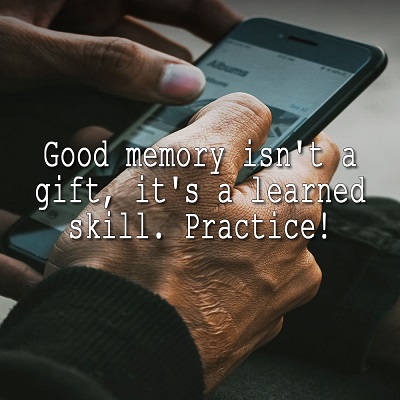 Do you know that it’s possible to memorize the sequence of an entire deck of cards in just 12.74 seconds? Shijir-Erdene Bat-Enkh of Mongolia can, and holds the record for the most cards memorized in the shortest period of time. Other people hold records of other ‘memory’ achievements. How can people do this? How are they able to memorize hundreds of details so quickly?
Do you know that it’s possible to memorize the sequence of an entire deck of cards in just 12.74 seconds? Shijir-Erdene Bat-Enkh of Mongolia can, and holds the record for the most cards memorized in the shortest period of time. Other people hold records of other ‘memory’ achievements. How can people do this? How are they able to memorize hundreds of details so quickly?
Aside from years of dedicated practice to memory sport, there are several ways that our memory can be improved. You don’t have to compete in a memory sport event to improve your memory. Having a sharp recall can help us in several ways, and the best part is that most of the methods in which world champions use can also be applied in our daily lives.
Here are some ways that can help you improve your memory:
1 – Get Focused
Focusing your attention is probably the easiest way you can improve your memory. It will be easier for you to remember a piece of information or detail when you are actively attending to it. When we mindfully pay attention to the information that we want to remember, it is easier for the brain to move it to our long-term memory.
Nelson Dellis, a memory champion, says our brain needs to be present to receive information, and the best way to do this is to be focused.
2 – Use Visualization
For more practical uses, say you need to remember a new word, phrase, or item. Thinking in pictures is a great memory aid. By attaching the word or phrase to an image, recalling the image will also bring up the associated item you need to recall. This imagery will train your brain to become better at recalling specific information.
3 – Build On What You Know
Relating unfamiliar concepts to what we already know can greatly help us remember it. This is because we connect the new information to a previously existing memory, making it easier for us to recall it.
This technique can be used whenever we need to study unfamiliar material. But we can also use it for more practical situations, like remembering an address or a person’s name, by connecting the new information to something we already know.
4 – Make Use of Mnemonics
Does the term ‘ROY-G-BIV’ ring a bell? Or does My Very Educated Mother Just Served Us Nine Pizzas make any sense?
ROYGBIV is simply a mnemonic for the seven colors of the rainbow while the statement about my educated mother is a mnemonic for the names of the planets.
Mnemonic are mental techniques that make it easier to remember information. It has been used for hundreds of years to help schoolchildren memorize information. But adults can still make use of mnemonic techniques in recalling the order of information and details for other things.
Effective mnemonics are the ones that have a catchy tone to it (roy-gee-biv) or something that evokes humor or novelty (An educated mother serving pizza?).
5 – Rehearse and Elaborate
Our brain only stores information in our short-term memory for about twenty seconds. If the information is not rehearsed or repeated, it is highly likely that we would forget about it as the information failed to make it to our long-term memory.
One way to commit information to our long-term memory is through elaborations and rehearsal. This simply means we need to keep on recalling and reviewing that information or detail we want to remember. We should rehearse the information at spaced intervals rather than cramming everything so that our brain can process the information more effectively.
Being able to recall and memorize information can help us in so many different ways. It can help us with our studies, work, and other more practical situations. You don’t need to be an aspiring memory champ for you to start improving your memory. Anyone can improve with practice, so don’t sell yourself short by claiming you have a poor memory.






